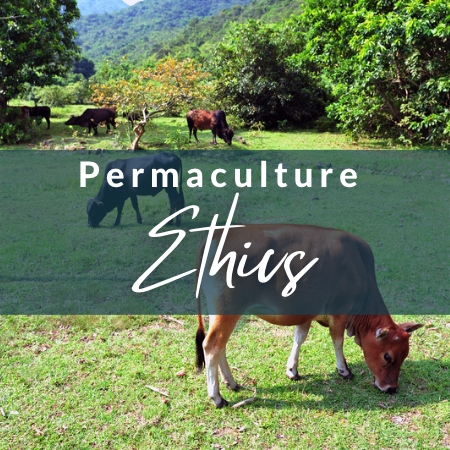The foundational ethics of permaculture are earth care, people care, and fair share. Only three ethics to remember! These are important guides, and they are woven together to build trust and resiliency in a system.
Earth Care
The first thing most people think of when they hear this ethic is to care for everything! That can feel pretty overwhelming… it is a very big planet after all! The answer though is in soil. Soil is the foundation of all life. We need healthy, living soil! This is achieved through the careful management of our land.
When we take care of soil we take care of the living things depend on it. Plants are healthier, providing habitat for insects and wildlife. These are integral to the ecosystem as they maintain balance, disperse seeds, pollinate, and do other good things!
First Nation people lived more peacefully with nature than modern society does. Most understood that their survival was dependent on how they treated the earth. Modern society has become far removed from this ‘need’ to survive through the same means. We developed factory farming, among other things, and made life easier for ourselves. But in doing so we polluted waterways, damaged soils, and we have created so much waste! We have a disposable attitude to most things in society. But in permaculture, we aim our designs at reducing waste and reusing what we can. We aim to improve relationships and land care methods. We can do better by observing first nation people’s approach to land care. We can do better by mimicking natural forestry ecosystems.
The point is not to dismiss modern advancements, though. We need many modern technologies and materials for safer, healthier living! But we must learn to live more sustainably. We must learn to reduce and reuse waste. We need to start farming with regenerative and sustainable methods. We have to start living thoughtfully with our earth. We weave this ethic into the following two so we can do a better job of caring for the earth as a global community.
People Care
People care starts with you. Followed by your family, friends, and then the greater community. And I don’t mean go treat yourself to something wasteful, or join the high consumerism mindset! I mean, you need to care for the non-material well-being of who you are. Food, water, safety, love, community… whatever that means for you! Understanding human needs help us to better understand what support other people need.
Do you ever have a neighbor that was a real grump? Or maybe you’ve heard the stories of feuds between neighbors over little things? Maybe you’ve heard the saying, “treat others the way you would like to be treated.” These are all relevant to this permaculture ethic, too. What do those people need, and can we help them to meet those needs? When we treat others with compassion we are building trust and community. When we are honest and accountable for ourselves, we build trust and we build resiliency.
An example of this can be seen in the event of natural disasters, war, or famine. When floods occur, the stories of selfless acts come out. When we see refugees fleeing due to the outbreak of war, people open their homes and hearts. These positive communities help others to restore their faith in humanity. In permaculture, we are always encouraging this positive focus and approach.
Part of the human condition is to seek connection. To find your people. To be a part of something that matters to you. People care helps everyone to meet their hierarchy of needs, and then they can help others. And that hopefully creates a cycle! Self-care is followed by family, friends, and the greater community. Each person in the community is influenced to some degree to engage in the people care ethic.
People care builds resiliency!
Did you ever have a neighbor that was a real grump? Or maybe you’ve heard the stories of feuds between neighbors over little things? Maybe you’ve heard the saying, “treat others the way you would like to be treated.” These are all relevant to this permaculture ethic, too. What do those people need, and can we help them to meet those needs?
When we treat others with compassion we are building trust and community. When we are honest and accountable for ourselves, we build trust and we build resiliency. We build community. An example of this can be seen in the event of natural disasters, war, or famine. When floods occur, the stories of selfless acts come out. When we see refugees fleeing due to the outbreak of war, people open their homes and their hearts. These positive communities help others to restore their faith in humanity. In permaculture, we are always encouraging this positive focus and approach.
Part of the human condition is to seek connection. To find your people. To be a part of something that matters to you. People care helps everyone to meet their hierarchy of needs. And so the cycle continues from self-care to family, friends, and the greater community. People care builds resiliency.
Fair Share
This is where we give back, recycle, and share with our family, friends, & communities. Imagine you only have yourself to feed but your tree has produced more than enough fruit for you this year. What will you do with the fruit you can’t eat before it goes bad?
You might first offer it to your parents, cousins, or family friends! You might then take it to work and offer it up to colleagues. Maybe take a box of it to your children’s school for the staff lunches or other families during pick-up times. There are food drives for the homeless, or churches that know low-income families who need help.
Maybe some of it goes to compost. That is sharing back with the soil and earth (see ethic one, earth care). Some of it may be chicken or livestock feed or becomes wildlife forage. Perhaps you need to sell it fresh at the market to support other living expenses. These are all examples of self-care, but also examples of fair share too. Are you starting to see how these are all tied together?
Fair share doesn’t have to be fruit and vegetables. Fair share may be other resources, such as time or education. When we have a neighbor who has asked for advice on a pest issue, you offer advice and help them. When a disabled person in the community can’t complete a task, you could volunteer your time to help them. This is part of being a good person, and we strongly encourage it. When we combine these 3 ethics together, we build stronger communities and relationships!





